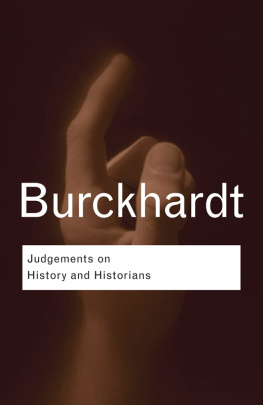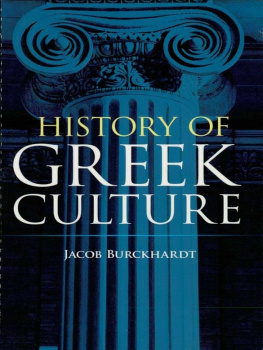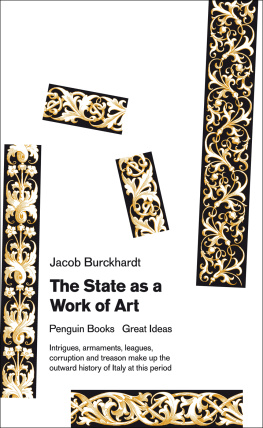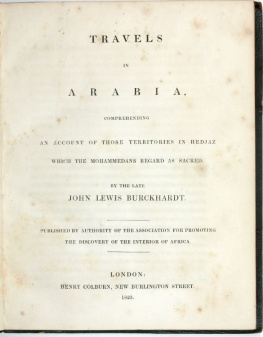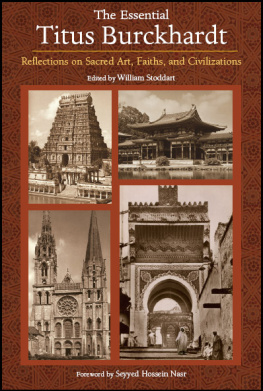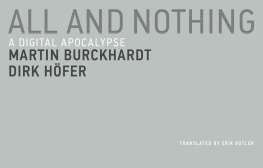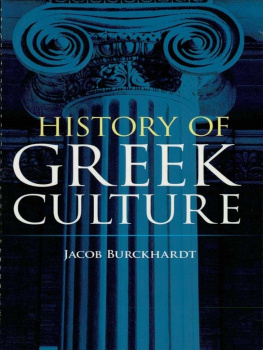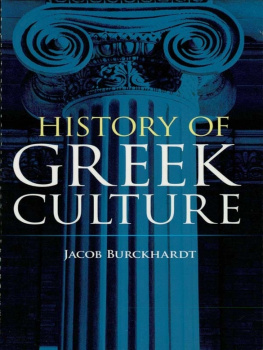Judgements on History and Historians
These are summary judgements classroom bullet-points, aimed with sniper-accuracy and drumhead-deadliness. It is amazing how often a century and a half ago Burckhardt was right. And when he was wrong, he was productively provocative. To read these fragments is to recapture what it was like to be in the lecture-hall with one of the great historical teachers of all time.
Felip Fernndez-Armesto
Burckhardts wise and disillusioned comments on human affairs have not dated and they make a welcome antidote to simplistic views of progress and modernity. His concern for culture as well as politics should appeal to readers of the twenty-first century.
Peter Burke
Burckhardts lively intelligence and massive learning create ideas that shoot off the page like fireworks.
Sunday Telegraph

Routledge Classics contains the very best of Routledge publishing over the past century or so, books that have, by popular consent, become established as classics in their field. Drawing on a fantastic heritage of innovative writing published by Routledge and its associated imprints, this series makes available in attractive, affordable form some of the most important works of modern times.
For a complete list of titles visit
www.routledge.com/classics
Jacob
Burckhardt
Judgements on History and Historians
With an introduction by Hugh Trevor-Roper

First published 1959 by George Allen and Unwin
First published in Routledge Classics 2007
by Routledge
2 Park Square, Milton Park, Abingdon, Oxon OX14 4RN
Simultaneously published in the USA and Canada
by Routledge
711 Third Ave, New York, NY 10017
Routledge is an imprint of the Taylor & Francis Group, an informa business
1959 George Allen and Unwin
All rights reserved. No part of this book may be reprinted or reproduced or utilized in any form or by any electronic, mechanical, or other means, now known or hereafter invented, including photocopying and recording, or in any information storage or retrieval system, without permission in writing from the publishers.
British Library Cataloguing in Publication Data
A catalogue record for this book is available from the British Library
Library of Congress Cataloging-in-Publication Data
Burckhardt, Jacob, 18181897.
[Historische Fragmente. English]
Judgements on history and historians / Jacob Burckhardt; with an introduction by Hugh Trevor-Roper.
p. cm.
Originally published: London: Allen & Unwin, 1958.
Includes bibliographical references and index.
1. World History. I. Title.
D21.B973 2007
907.2 dc22 2006031267
ISBN10: 0415412935
ISBN13: 9780415412933
TRANSLATORS PREFACE
I consider it a privilege to be the translator of a work about which Walter Goetz, the editor of the Propylen-Weltgeschichte, wrote: It is impossible to imagine a more profound introduction to world history and its driving forces.
Jacob Burckhardts Historische Fragmente were selected by Emil Drr from Burckhardts lecture notes for his history courses at the University of Basel during the period from 1865 to 1885. The Fragmente, which were first published in 1929 as Volume Seven of Burckhardts Collected Works, may be regarded as a companion volume to his Weltgeschichtliche Betrachtungen (published in English as Force and Freedom). The present translation is based on the edition issued in 1942 by Benno Schwabe, Basel, and the Deutsche Verlagsanstalt, Stuttgart. It has been checked against the virtually unchanged new edition issued by the K. F. Koehler Verlag of Stuttgart at the end of 1957.
The very qualities that make Burckhardts work so unique and attractive, even exasperatingly charming the tone of improvisation; the compressed, elliptical style, by turns professorial and colloquial; the occasional contradictions and ambiguities; the abrupt shifts also provide a real challenge to the translator. Burckhardt wrote in the rather austere Swiss-German of the nineteenth century, and his language, moreover, seems to reflect his personal wilfulness, his sharp criticism of his time. Within the limits of reasonably clear and idiomatic English I have tried to reproduce some of Burckhardts stylistic peculiarities. His emphases and question marks as well as other evidences of his erudite musings have been faithfully retained throughout; a few factual inaccuracies have been corrected. Since this edition is intended for the general reader interested in history as well as for the specialist, it was decided to omit most of the critical and bibliographical apparatus of the German edition, which consists in large part of specific information about Burckhardts various manuscripts, variant readings, and passages later deleted by Burckhardt himself. Wherever possible, those footnotes of the German edition that were deemed essential have been incorporated into the text, but minutiae and bibliographical references to works not readily accessible today have generally been omitted in an effort to promote continuity and readability.
I should like to express my appreciation to Philip Rieff, Janet Finnie, John Rackliffe, Paul Alexander, and John Wight for their helpful interest in this work. The last-named kindly supplied the translations from the Greek and Latin. Katharine McCagg was good enough to compile the Index.
H. Z.
INTRODUCTION
History, wrote Jacob Burckhardt, is the record of what one age finds worthy of note in another. This definition implies a changing standard. It also implies a changing standard in our choice of historians, and of such a change Jacob Burckhardt himself is now a beneficiary. When he died in 1897 he was known as an interesting minor historian and, more particularly, an art-historian. Today, increasingly, he is regarded as one of the great philosophical historians of the nineteenth century. A misfit in his own age, he has become, as misfits sometimes do as Alexis de Tocqueville and Lord Acton have also done of far greater significance to us than his more famous, or at least more fashionable, contemporaries. He is now one of the historians whom this age finds worthy of note in that.
How has this happened? To what accident, or what gifts of perspicacity or prophecy, does Burckhardt owe this posthumous fame? In part, it is because his intellectual loneliness isolated him from those nineteenth-century truisms which we now find invalid or vulgar. But that is at best a negative virtue. There is also a more important, positive reason. Burckhardts interest in art and in all the creations of the human spirit gave him a far wider view of history than was possessed by many of his contemporaries, who concentrated narrowly on the task of establishing political facts. The greatest of such historians was Burckhardts own teacher, Leopold von Ranke. Ranke sought indefatigably to establish the facts of history wie es eigentlich gewesen ist. His achievement in that direction was enormous. And yet today he is outdated in a way in which the far less accurate Burckhardt is not. For accuracy is always replaced by greater accuracy, which profits by its predecessor: that is the fate of any science. But Burckhardts history is both wider and more personal. He did not separate the creative and political activities of man. History, to him, was the history of civilization, and the history of civilization, he wrote,
overlaps with church history, the history of law, literary history, the history of communications, the history of morals, etc., according to its requirements, but it does not make any claim to being all these things itself. Its selection of data follows its inner principle.
Next page
